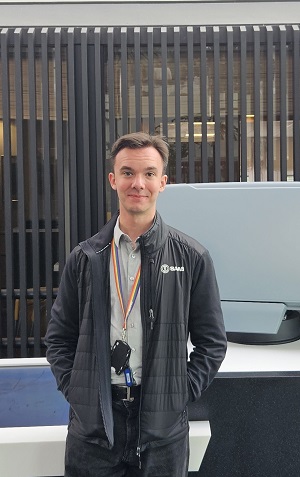Johan Bellbrant: SAAB Group
Johan's educational journey at KTH not only deepened his understanding of electromagnetics but also equipped him with valuable skills in project management and teamwork, preparing him for the complexities of the industry. Johan currently works as a Systems Engineer at SAAB. His role allows him to explore modern sensor solutions within a dynamic work environment, where he juggles multiple projects and collaborates with a diverse team.

What can a regular day look like at your job?
It is a bit difficult to write specifics about my line of work, due to the secret nature of the industry. However, what I can say is that I work in the so-called Study Program at SAAB, focusing on modern sensor solutions. One thing I really appreciate about my current position is the variety with which I will spend the day. Some days I work on ensuring that different projects proceed seamlessly, some days I might focus on specialised studies in antenna engineering. A day might solely consist of administrative work, the next day might include system design, and the day after that might be a practical trial where we test entire system integrations. There are plenty of ongoing parallel projects and standing questions about what should be prioritised, which was a learning curve for me. In the master's programme, you might have a handful of different courses and projects to prioritise in between. In my current position, we are much more agile than in my former studies. SAAB is a large company spanning several countries; there are many other positions available if I do not appreciate the variety in my line of work and the agility of my team. It is extremely motivating to have the privilege of working within a relevant industry and feel that you are a small part of keeping society safe.
Why did you choose this programme at KTH?
I was consistently fascinated by electromagnetics during my bachelor's studies in Electrical Engineering, which I also completed at KTH. It is essentially invisible and sophisticated engineering. To first delve into the deep mathematics of the topics and thereafter experience how practical designs and measurements are conducted was motivating. We also had a great time with the researchers from these departments during the bachelor's programme courses. Therefore, it was clear that I would select this master's programme, specifically in Microwave Engineering, from the start. But it was even more assured during the entire bachelor's programme experience.
Are there any insights or knowledge you acquired during your studies that have been extra useful for your career?
Project courses with group assignments, which cannot be understated. Only about 20 % of the people starting the programme this year were from Sweden. Adapting and learning from other students, mostly from completely different working cultures, has been and will be useful in my career. Furthermore, gaining insights into how I act and function around different personalities has also been good knowledge. In the industry, no project can be completed by a lone wolf.
The programme's final year was closely connected to actual research conducted by the department. This, together with my industrial master's degree project in antenna engineering, was a great experience for my career, resulting in additional insights into where contemporary studies lie and how research might be planned.
One great thing about KTH in general is that programmes are not solely theoretical. The majority of courses provide practical knowledge in the respective field of study. Not only were these labs a good contrast to the sometimes overwhelming maths, but these insights and intuitions have proven to be very useful.
What were the best aspects of your studies at KTH?
Of course, I had the privilege to select the field of study I've been interested in from the start. The great thing about the programme is that you can tailor your degree and overlap between the four tracks. Depending on which topics you enjoy the most, there are great opportunities during the studies to build connections to companies and organisations as a gateway to applying for different jobs after the studies.
What is the best memory of your time at the university?
I feel most nostalgic about the times we sat through assignments together between lectures. The times you were in it together, making the difficult tasks manageable and, lastly, seeing satisfying end results.
What are your plans for the future?
I am very comfortable where I am right now, so I plan on staying at this position for some time to get a better understanding of how the industry works. As mentioned, there is a notable difference between academia and industry, and I have lots to learn from my current position. Also, I would like to run 10 km, faster. I have had time to pick up my joy of running, so I am looking forward to that!
What would you say to a student considering applying for this programme?
Do not worry; send an application. The departments providing the courses for this programme have very helpful and knowledgeable researchers. Do not hesitate to reach out if you have any questions, and do not be afraid to tailor your own degree based on your interests. Lastly, take the chance and learn from other students, not only during labs but also by working through assignments together.
